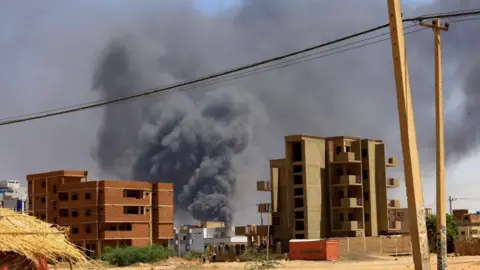Sudan war: Two people killed in attack on aid convoy in Sudan, says Red Cross
 Reuters
ReutersTwo people have been killed and seven others injured in a "deliberate attack" on an aid convoy in Sudan's capital Khartoum, the Red Cross has said.
The vehicles - which the charity said were "clearly marked with a Red Cross emblem" - were due to evacuate more than a hundred civilians.
The wounded included three charity staff, the International Committee for the Red Cross (ICRC) said.
In a statement the ICRC said it was "shocked and appalled".
Sudan's civil war between the army and the paramilitary Rapid Support Forces is now in its eighth month.
Earlier on Sunday, the East African regional body Igad said it had secured a commitment from both sides to implement a ceasefire and hold face-to-face talks.
It said the army chief and the head of the RSF had both committed to a peaceful settlement. However previous commitments have been broken.
The attack happened in al-Shajara neighbourhood, located in the west of the city, on Sunday, the ICRC said. It added that "over a hundred vulnerable civilians" were due to be moved from Khartoum to Wad Madani.
The humanitarian operation was requested by, and co-ordinated with, the parties to the conflict, it said - and that both had given security guarantees.
Pierre Dorbes, the head of the ICRC delegation in Sudan, said the attack was "unacceptable", before adding: "I am shocked by the total disrespect for the Red Cross emblem, which must be respected and protected in accordance with international humanitarian law.
"Our mission today was to bring these civilians to safety," Mr Dorbes continued.
"Instead, lives have been tragically lost. My heart goes out to the loved ones of the people killed, and we desperately hope those injured will make a full recovery."
Those being evacuated included the sick, children, orphans and the elderly needed to be moved to a safer area.
The evacuation operation has now been cancelled until a fresh security assessment can be made.
The ICRC has called for immediate protection for all civilians, including humanitarian workers and medical personnel.
A coup in Sudan two years ago saw the overthrow of a power-sharing arrangement between military and civilian leaders following the ousting in 2019 of long-term authoritarian President Omar al-Bashir.
It came at a time of deep economic crisis with high inflation and shortages of food, fuel and medicine.
A council of generals took over - led by the two military men at the centre of current dispute: Gen Abdel Fattah al-Burhan, the head of the armed forces and in effect the country's president, and his deputy and leader of the RSF, Gen Mohamed Hamdan Dagalo, better known as Hemedti.
They disagreed on the direction the country was heading and the proposed move towards civilian rule.
Fighting in Sudan started in April after members of the RSF were redeployed around the country in a move that the army saw as a threat.
There had been some hope that talks could resolve the situation but these never happened.
It is disputed who fired the first shot but the fighting swiftly escalated in different parts of the country.
More than six million people have so far been displaced by the war, the UN says.